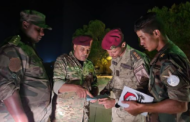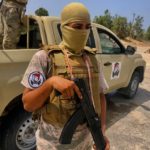In Sharara, Russian and other foreign mercenaries have entered Libya’s largest oil field – Sharara.
In Sirte, four fighters loyal to Khalifa Haftar surrendered themselves and their weapons to the security forces of the Libyan Army on June 23.
In Tripoli, the Counter-Terrorism Unit of the Joint Security Operations Room has arrested a suspected member of the Al-Qaeda organization identified to be a Tunisian national.
On the international level, Russian President Vladimir Putin and French counterpart Emmanuel Macron called on June 26 for a ceasefire in Libya and a return to dialogue.
Germany, France and Italy have called on conflicting parties in Libya to “immediately” and “unconditionally” cease fighting and engage in talks for a sustainable and credible cease-fire agreement. In a joint statement released on June 25 night, the three EU member states voiced concern over rising tensions and regional instability amid recent threats to intervene by Abdel Fattah al-Sisi, the president of neighboring Egypt.
SHARARA OIL FIELD
- Russian and other foreign mercenaries have entered Libya’s largest oil field – Sharara – the country’s National Oil Corporation said on June 26, describing the development as an attempt to thwart the resumption of halted oil production in Libya. The Russian mercenaries first met late June 25 with the guards of Libya’s vast southwestern Sharara oil field, controlled by Haftar’s fighters, according to a statement from the NOC.
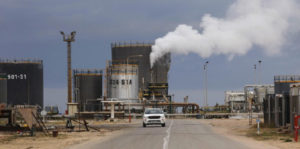
SIRTE
- four fighters loyal to Khalifa Haftar surrendered themselves and their weapons to the security forces of the Libyan Army on June 23. In a statement, the Libyan Army said the militia fighters received fair and just treatment and all legal measures were taken on their behalf, noting that due consideration will be afforded to them in the matter of their surrender, to avoid conflict and reduce punishment in their cases. The Libyan Army called on all such lingering fighters in the western region to surrender themselves and their weapons to the authorities in order to ensure their safety, which would work in their favour in a reduction of culpability on their part.
TRIPOLI
- the Counter-Terrorism Unit of the Joint Security Operations Room has arrested a suspected member of the Al-Qaeda organization identified to be a Tunisian national. The Counter-Terrorism Unit gathered information about the alleged terrorist who was wanted by the Attorney General’s Office and managed to track him down in a house located in the Old City of Tripoli, a statement by the Joint Security Operations room explained, noting that he was arrested upon permission of the Attorney General Office. The operation took place at dawn on June 23 in cooperating with the Security Operations Department at the Ministry of Interior.
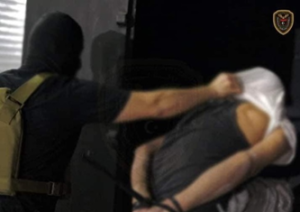
INTERNATIONAL RELATIONS
- Head of the Tripoli-based Presidential Council, Fayez al-Serraj, and Italian Prime Minister Giuseppe Conte have agreed on the return of Italian companies to Libya and the resume of their work in the country, during a meeting between the two in Rome on June 27;
- the US State Department renewed its rejection of foreign military intervention in Libya, stressing the need for an immediate ceasefire, confirming its rejection of the attack being prepared for by the Tripoli-based Government of “National Accord” (GNA) and Turkish forces on Sirte;
- Russian President Vladimir Putin and French counterpart Emmanuel Macron called on June 26 for a ceasefire in Libya and a return to dialogue, the Kremlin said in a statement following a phone call between the two leaders. On June 25, France, Germany and Italy called on forces in Libya to cease fighting and for outside parties to stop any interference in a bid to try and get political talks back on track. Both France and Russia have been found by UN and international reports as guilty of supporting Haftar with military equipment, arms and fighters in his bid to seize power from the internationally recognized government in Tripoli;
- Germany, France and Italy have called on conflicting parties in Libya to “immediately” and “unconditionally” cease fighting and engage in talks for a sustainable and credible cease-fire agreement. In a joint statement released on June 25 night, the three EU member states voiced concern over rising tensions and regional instability amid recent threats to intervene by Abdel Fattah al-Sisi, the president of neighboring Egypt;
- on June 25, the Maltese Ambassador to Libya, Charles Saliba, has expressed his appreciation for the hard work conducted by the Libyan Coast Guard in saving lives in the Mediterranean Sea. Ambassador Saliba extended thanks for all sailors on board the patrol boats of the Libyan Coast Guard who are risking their lives to save others;

- Turkey’s presidential spokesman Ibrahim Kalın said on June 25 said the Libyan internationally recognized Government of National Accord (GNA) demanded that Khalifa Haftar’s forces withdraw from Sirte and Al-Jufra as preconditions for ceasefire talks;
- speaking at a press briefing in Washington DC on June 24 and in answer to the question: ‘‘On Libya, are you willing to (inaudible?) – for a regional conflict in Libya between Turkey and Egypt specifically?’’, U.S. Secretary of State Pompeo said: “We have worked closely with our European partners to try and get these talks restarted. I was in Berlin now several months back. The mission set remains the same: to get the fighting to stop; to reduce the number of arms flowing there from any place, whether that’s from the Turks, from the Russians, from anyone; to reduce the footprint of the military conflict; and then to find a political solution to resolve, to get a stable, peaceful situation in Tripoli and in Libya more broadly. We’re still hopeful that we can get all of those who have an interest there to the table to have these discussions and come to a political resolution.”;
- the Head of the Presidential Council Fayez al-Serraj and the Italian Foreign Minister Luigi Di Maio met on June 24 in Tripoli and discussed the importance of returning to the political process and rejecting the negative foreign interventions in Libya;
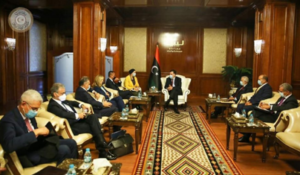
- the United Arab Emirates has declared its support for French criticism against Turkish interference in Libya, after French President Emmanuel Macron said on June 22 that Turkey is playing “a dangerous game” in Libya. “The UAE affirms its solidarity with France in the face of Turkey’s continuing offensive declarations and actions,” UAE Foreign Minister, Anwar Gargash, tweeted on June 24. “We strongly condemn its dangerous behaviour and hostile action against a French navy vessel on a NATO mission to enforce the UN arms embargo earlier this month,” Gargash added;
- Turkey has criticized France’s remarks on Ankara’s support for the internationally recognized government in Libya, saying Paris aims to restore old colonial rule in Libya;
- Syria announced on June 23 its support for what it described as “the Libyan National Army led by Khalifa Haftar” and for Egypt’s initiatives with regards Libya, Minister of Assad regime’s Foreign Affairs, Walid al-Muallem, said;
- the Russian Foreign Minister, Sergey Lavrov, called on June 23 for an immediate ceasefire in Libya, adding that the external parties should provide suitable conditions for in-depth dialogue between the conflicting parties in the country;
- Arab foreign ministers stressed on June 23 that foreign military presence in Libya threatens the security and stability of the whole region. In an Arab League emergency video conference, the Arab countries said that a political solution is the key to solving the Libyan crisis;
- Egyptian Foreign Minister, Sameh Shoukry, confirmed on June 23 that his country will not hesitate to take any action to prevent falling of Libya under the control of terrorist groups and armed militias;
- the German Foreign Ministry has issued a statement expressing its discomfort of the Egyptian President Abdel Fattah al-Sisi’s remarks regarding potential military intervention in Libya;
- the UN Spokesman, Stephane Dujarric told reporters on June 22 that the last thing Libya needs is more weapons, mercenaries and fighting on its soil. “The United Nations is closely monitoring the situation in Libya, and it is important for all parties to refrain from any action that might aggravate the situation,” Dujarric said in response to a question about the UN head Antonio Guterres position regarding Al-Sisi’s recent statements on Libya;
- in a statement released on June 22, the US State Department stressed the need for a military pause in Libya’s conflict and a return to negotiations. The statement came after U.S Ambassador Richard Norland and AFRICOM Commander Stephen Townsend met Fayez al-Serraj, Libya’s internationally recognized prime minister, in Zuwara, Libya, on June 22;
- the Libyan Foreign Minister Abdul Hadi al-Hwaij, with his Saudi counterpart Prince Faisal bin Farhan Al Saud, reviewed the latest developments of the Libyan situation. This came in a telephone call on June 22, during which they discussed the political efforts made by brotherly and friendly countries to reach a political settlement after the “Cairo Declaration”;
- French President Emmanuel Macron pointed the finger at Turkey on June 22 over its support of the Tripoli-based Government of National Accord (GNA) in Libya, saying Turkey was playing “a dangerous game” that went against everything it had agreed to in international talks;
- Tunisian President Kais Saied said on June 23 the Tripoli-based Government of National Accord (GNA) is based on international legitimacy and must be replaced by a legitimate government which is born of the will of the Libyan people.




